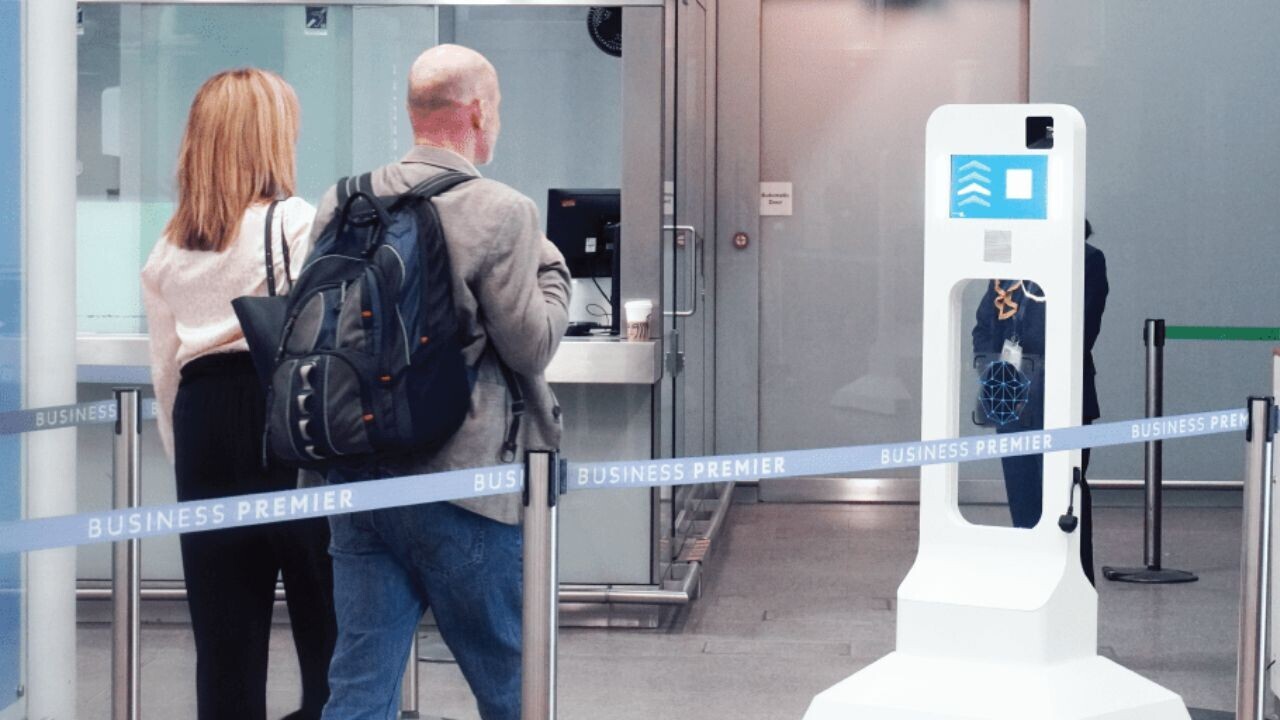
The first-ever biometric corridor for train travel opened today at Eurostar’s London terminal.
The system, developed by British tech firm iProov, replaces border checks with a facial verification checkpoint that you just walk straight past.
Before travel, the passenger downloads the app, authenticates their ID, scans their face, and links their ticket. On arrival at St Pancras Station, they stroll through a dedicated lane for the tech — dubbed SmartCheck — which verifies their entry.
The system lets users skip ticket gates and manual border control in the UK. After baggage inspection and a passport check at the French border, they’re free to board the train.
With no fiddly paper documents, prying British sentries, or protracted camera scans, SmartCheck promises shorter queues and smoother throughput. Initially, the system will only be available for Eurostar’s Business Premier and Carte Blanche passengers. But the company aims to extend the service to all customers and — perhaps — more borders.
The CEO of Eurostar, Gwendoline Cazenave, told TNW that she plans to provide a launchpad for the tech.
“We wanted to show that seamless, automated cross-borders are not just science fiction — they’re now a reality,” she said.

SmartCheck is years in the making. In 2020, the UK’s Department for Transport awarded iProov part of a £9.4m fund for innovative rail projects, which was used to develop the biometric system. The next year, live trials of the contactless service began at Eurostar.
“In the original trial we had people stopping — and people don’t like to stop,” said Dominic Forrest, CTO at iProov. “That’s when we decided to shoot for the free-flow experience.”
A day before the launch, TNW trialled the tech. Aside from some issues with mobile internet in the station, the experience was seamless.
After entering the biometric lane, we strolled straight past the facial verification checkpoint. From the other side, we could see the system uses a commercial iPad. The speed and accuracy, says Forrest, derive from the processing power and face-matching algorithms that run on the device.
“This is not surveillance. Users can choose whether to enrol or not.
Similar tech has been tested at airports, but this is the first deployment at a train station. According to iProov CEO Andrew Bud, rail travel presents extra challenges for biometric corridors.
“The controls are different, the throughput is different, and the way that information flows is very, very different,” he said.
The space is also different. At peak levels, around 11 million annual Eurostar customers pass through an area the size of three tennis courts — which means efficient checks are vital.

Another difference is the level of surveillance. According to Bud, the biometric systems in airports are more intrusive than SmartCheck.
“The information all flows through the airport backbone, so your face and identity data is controlled by the airlines and the facial verification system in the airport,” Bud said. “In this case, it’s sitting in your phone.”
Bud is keen to address concerns about surveillance. According to iProov, all personal data is stored securely on the user’s smartphone and encrypted during operation. Once verified, the information is only shared with the ticket gate and passport control services. After a maximum of 48 hours, it’s deleted from these systems.
Privacy campaigners have also raised fears about surveillance creep. Normalising facial verification, they warn, will accelerate adoption of intrusive monitoring tech. In response, Bud emphasises that SmartCheck is strictly an opt-in product. The users, he adds, will only be compared to images they submit, rather than any mass database.
“This is not surveillance,” he said. “A user can choose to enrol and use SmartCheck or not — and nobody will ever compel them to do so.”

Another concern around biometrics involves AI biases. Studies have shown that facial recognition has higher error rates for certain skin tones, genders, and ages. According to iProov, these biases have now been addressed in industry-leading systems.
As evidence, the company can point to recent research. In June, the National Institute of Standards and Technology (NIST) reported that each of the top 150 facial recognition algorithms is over 99% accurate for Black males, white males, Black females, and white females. Surprisingly, white men were the lowest-performing of the demographic groups for the top 20 algorithms.
Concerns will persist, but iProov’s research suggests the public will embrace the tech. According to a survey taken during trials of SmartCheck, 86% of users are likely to opt for the service.
In the future, they could get many more chances to try it.
“This is applicable to any kind of high throughput environment where you want to make sure that you know who’s going in,” Bud said. “That might be sports stadiums, music venues, even office buildings — anywhere you want to facilitate the entry of high volumes of pre-checked people into places where bad people could cause harm.”
Get the TNW newsletter
Get the most important tech news in your inbox each week.





